49+ Goodwill meaning in accounting Trading
Home » News » 49+ Goodwill meaning in accounting TradingYour Goodwill meaning in accounting coin are available. Goodwill meaning in accounting are a trading that is most popular and liked by everyone today. You can Download the Goodwill meaning in accounting files here. Get all free news.
If you’re looking for goodwill meaning in accounting images information linked to the goodwill meaning in accounting topic, you have pay a visit to the ideal site. Our website frequently gives you hints for refferencing the highest quality video and image content, please kindly search and locate more informative video content and images that match your interests.
Goodwill Meaning In Accounting. What is Goodwill in Accounting. What Is Goodwill In Accounting. An intangible asset consisting of the public esteem in which a business is heldWhen a business is sold the difference between the value of the hard assets and the value of the income stream is often attributed to goodwill. Home Accounting Dictionary What is Goodwill.
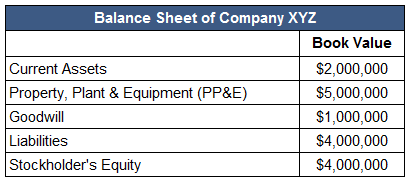 Goodwill Example Meaning Investinganswers From investinganswers.com
Goodwill Example Meaning Investinganswers From investinganswers.com
In accounting goodwill is an intangible asset associated with a business combination. Accounting goodwill is sometimes defined as an intangible asset that is created when a company purchases another company for a price higher than the fair market value of the target companys net assets. In accounting goodwill is an increase in value over the companys assets minus its liabilities. What Is Goodwill In Accounting. In accounting goodwill is recorded after a company acquires assets and liabilities and pays a price in excess of their identifiable net value. Goodwill is an accounting construct that is required under Generally Accepted Accounting Principles GAAP.
In accounting goodwill is an increase in value over the companys assets minus its liabilities.
The allowance is established by recognizing bad debt expense on the income statement in the same period as the associated sale is reported. The amount of goodwill is the cost to purchase the business minus the fair market value of the tangible assets the intangible assets that can be identified and the liabilities obtained in the purchase. Goodwill in the world of business refers to the established reputation of a company as a quantifiable asset and calculated as part of its total value when it is taken over or sold. Goodwill means good reputation of a companys business in the market. What is Goodwill in Accounting. Only entities that extend credit to their customers use an allowance for doubtful accounts.
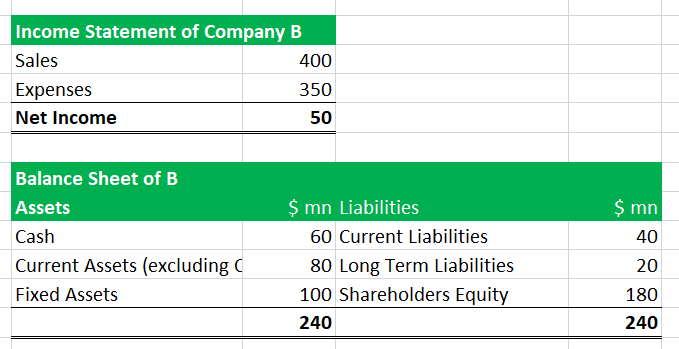 Source: wallstreetmojo.com
Source: wallstreetmojo.com
In accounting goodwill is recorded after a company acquires assets and liabilities and pays a price in excess of their identifiable net value. Is Goodwill An Intangible Asset. Goodwill is a companys value that exceeds its assets minus its liabilities. The Statement of Standard Accounting Practices SSAP-22 defines goodwill as the difference between the value of a business as a whole and the aggregate of the fair values of the separable net assets. Goodwill is an intangible asset that arises when a business is acquired by another.
 Source: byjus.com
Source: byjus.com
It is the vague and somewhat subjective excess value of a commercial enterprise or asset over its net worth. According to SSAP-22 UK Accounting Standard on Accounting for Goodwill Goodwill is the difference between the value of a business as a whole and the aggregate of. Specifically goodwill is the portion of the purchase price that is higher than the sum of the net. It represents the non-physical assets such as the value created by a solid customer base brand recognition or excellence of management. Is Goodwill An Intangible Asset.
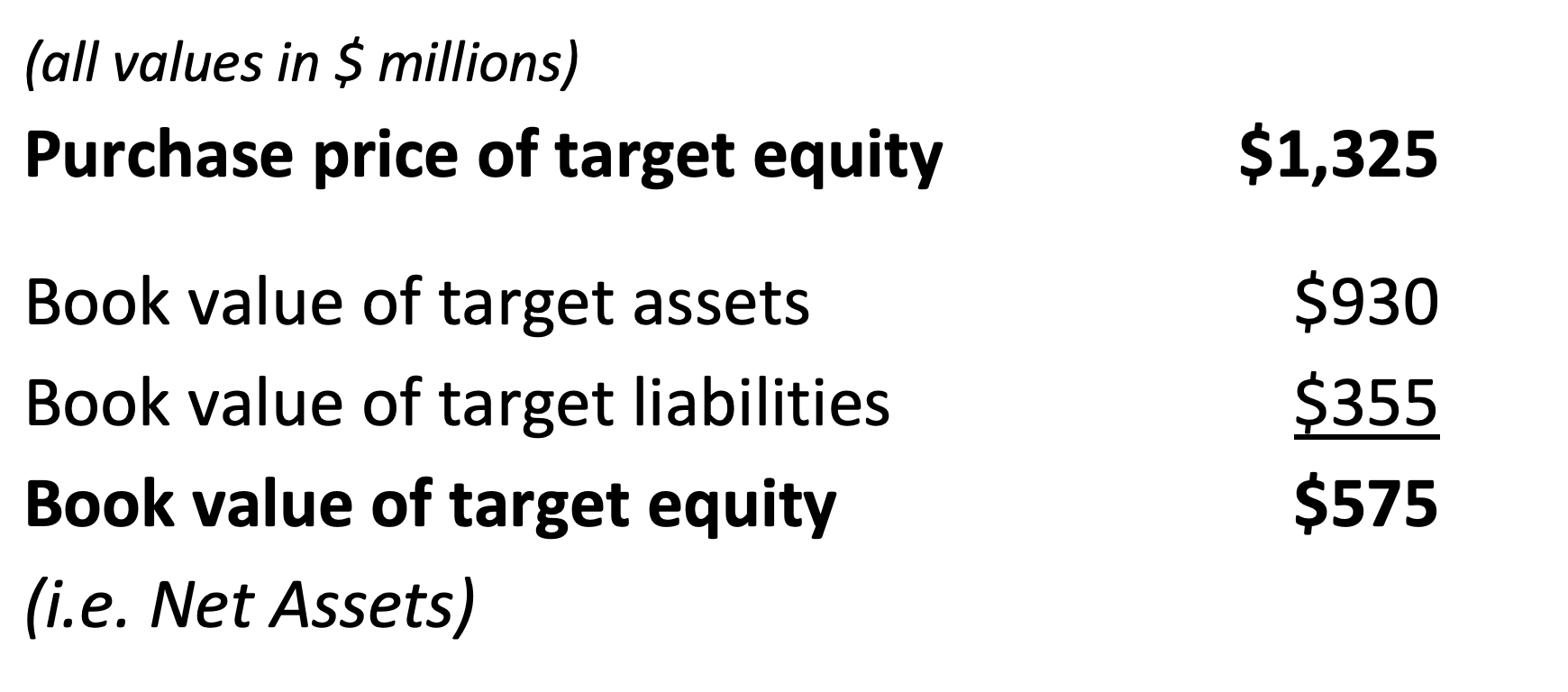 Source: marqueegroup.ca
Source: marqueegroup.ca
The goodwill must be evaluated for impairment each year. Goodwill arises when a company acquires another entire business. Some definitions of goodwill are. Goodwill is an intangible asset an asset thats non-physical but offers long-term value which arises when another company acquires a new business. What is Goodwill in accountancy terms.
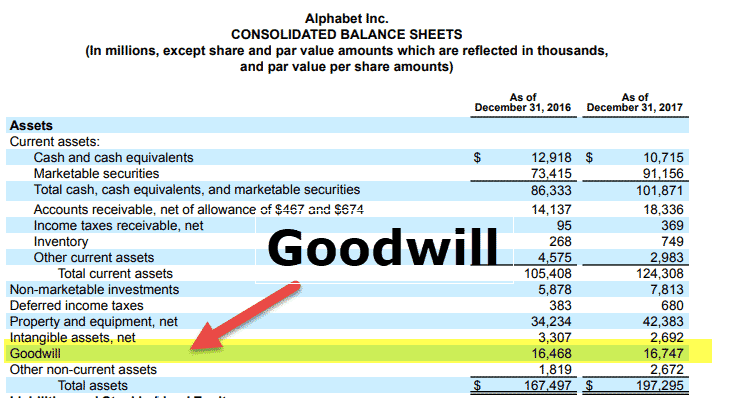 Source: wallstreetmojo.com
Source: wallstreetmojo.com
Is Goodwill An Intangible Asset. In accounting goodwill is recorded after a company acquires assets and liabilities and pays a price in excess of their identifiable net value. Goodwill refers to the purchase cost minus the fair market value of the tangible assets the liabilities and the intangible assets that youre able to identify. Goodwill is a long-term or noncurrent asset categorized as an intangible asset. An intangible asset consisting of the public esteem in which a business is heldWhen a business is sold the difference between the value of the hard assets and the value of the income stream is often attributed to goodwill.
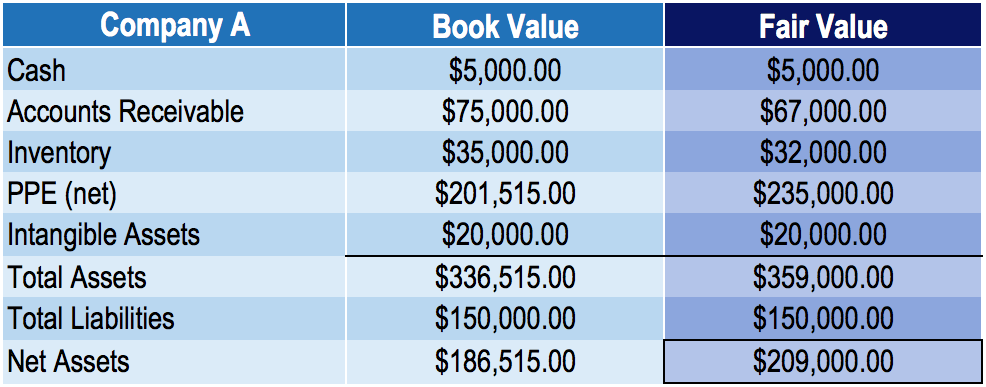 Source: corporatefinanceinstitute.com
Source: corporatefinanceinstitute.com
Goodwill is a long-term or noncurrent asset categorized as an intangible asset. Goodwill is the amount someone would pay over and above what the assets are actually worth on paper when buying a business. Goodwill is recorded when a company acquires purchases another company and the purchase price is greater than 1 the fair value of the identifiable tangible and intangible assets acquired minus 2 the liabilities that were assumed. The gap between the purchase price and the book value of a business is known as goodwill. Goodwill is an example of Intangible Non Current Assets and it is further.
Source: investopedia.com
According to SSAP-22 UK Accounting Standard on Accounting for Goodwill Goodwill is the difference between the value of a business as a whole and the aggregate of. Goodwill is an intangible asset that is associated with the purchase of one company by another. Goodwill is an intangible asset an asset thats non-physical but offers long-term value which arises when another company acquires a new business. What is Goodwill in accountancy terms. The amount of goodwill is the cost to purchase the business minus the fair market value of the tangible assets the intangible assets that can be identified and the liabilities.
 Source: investinganswers.com
Source: investinganswers.com
Some definitions of goodwill are. Goodwill is an accounting construct that is required under Generally Accepted Accounting Principles GAAP. What is Goodwill in accountancy terms. Home Accounting Dictionary What is Goodwill. Some definitions of goodwill are.
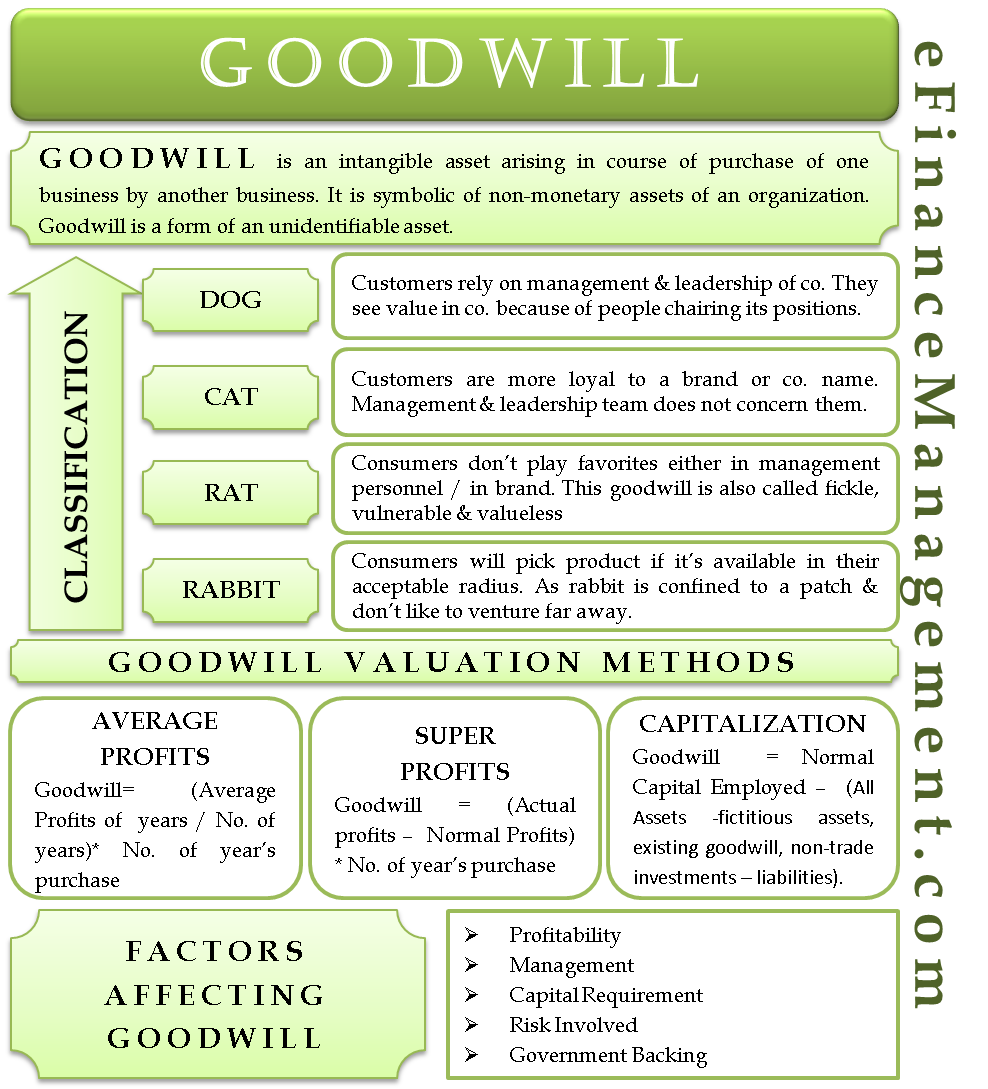 Source: efinancemanagement.com
Source: efinancemanagement.com
In accounting goodwill is recorded after a company acquires assets and liabilities and pays a price in excess of their identifiable net value. The Statement of Standard Accounting Practices SSAP-22 defines goodwill as the difference between the value of a business as a whole and the aggregate of the fair values of the separable net assets. Goodwill in the world of business refers to the established reputation of a company as a quantifiable asset and calculated as part of its total value when it is taken over or sold. Goodwill is recorded when a company acquires purchases another company and the purchase price is greater than 1 the fair value of the identifiable tangible and intangible assets acquired minus 2 the liabilities that were assumed. Goodwill refers to the purchase cost minus the fair market value of the tangible assets the liabilities and the intangible assets that youre able to identify.
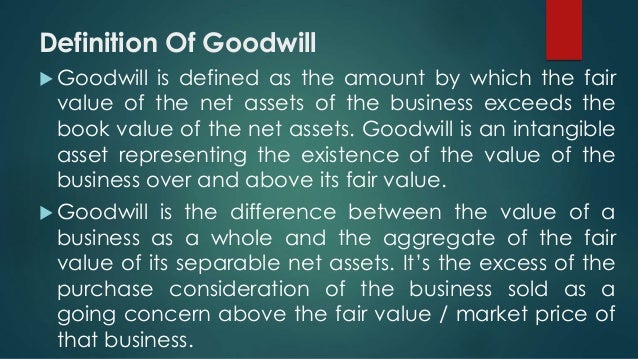 Source: slideshare.net
Source: slideshare.net
Goodwill is an intangible asset an asset thats non-physical but offers long-term value which arises when another company acquires a new business. Goodwill is recorded when a company acquires purchases another company and the purchase price is greater than 1 the fair value of the identifiable tangible and intangible assets acquired minus 2 the liabilities that were assumed. It is the vague and somewhat subjective excess value of a commercial enterprise or asset over its net worth. Find out more about goodwill accounting with our simple guide. The gap between the purchase price and the book value of a business is known as goodwill.
 Source: bankingprep.com
Source: bankingprep.com
Goodwill is an example of Intangible Non Current Assets and it is further. Goodwill in accounting is an Intangible Asset that is generated when one company purchases another company at a price which is higher than that of the sum of the fair value of net identifiable assets of. Goodwill Meaning in Accounting Goodwill arises when a company acquires another entire business. According to SSAP-22 UK Accounting Standard on Accounting for Goodwill Goodwill is the difference between the value of a business as a whole and the aggregate of. Home Accounting Dictionary What is Goodwill.
 Source: slideplayer.com
Source: slideplayer.com
Some definitions of goodwill are. It represents the non-physical assets such as the value created by a solid customer base brand recognition or excellence of management. According to SSAP-22 UK Accounting Standard on Accounting for Goodwill Goodwill is the difference between the value of a business as a whole and the aggregate of. Goodwill is the amount someone would pay over and above what the assets are actually worth on paper when buying a business. Goodwill is a long-term or noncurrent asset categorized as an intangible asset.
 Source: businessjargons.com
Source: businessjargons.com
Some definitions of goodwill are. In other words goodwill shows that a business has value beyond its actually physical assets and liabilities. Goodwill refers to the purchase cost minus the fair market value of the tangible assets the liabilities and the intangible assets that youre able to identify. In accounting goodwill is an intangible asset associated with a business combination. Goodwill is an intangible asset that is associated with the purchase of one company by another.
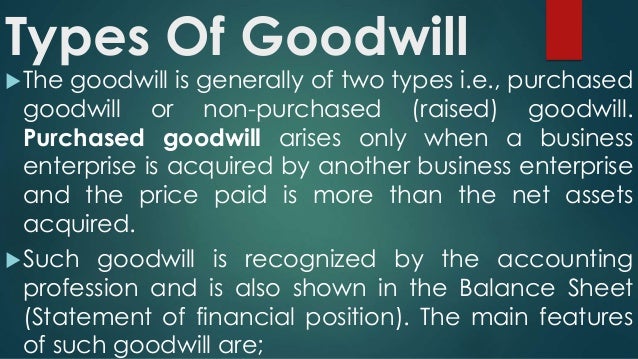 Source: slideshare.net
Source: slideshare.net
Goodwill is a companys value that exceeds its assets minus its liabilities. In accounting goodwill is an increase in value over the companys assets minus its liabilities. The goodwill must be evaluated for impairment each year. Examples are Good Customer Relationships Quality Management etc. What is Goodwill in accountancy terms.
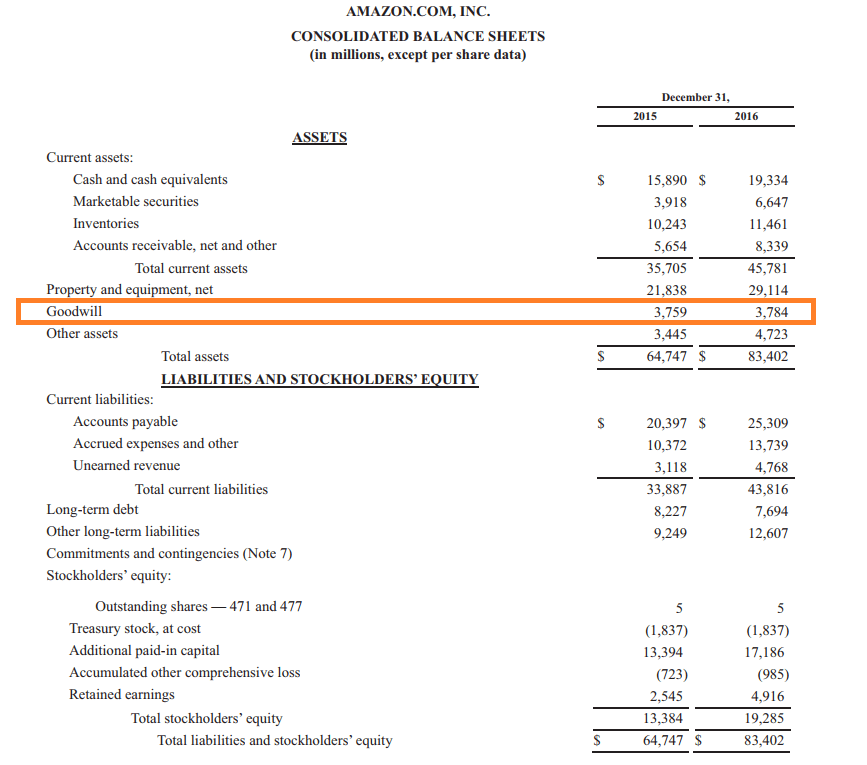 Source: corporatefinanceinstitute.com
Source: corporatefinanceinstitute.com
Goodwill is an intangible asset that is associated with the purchase of one company by another. In other words goodwill shows that a business has value beyond its actually physical assets and liabilities. Goodwill is the excess of purchase price over the fair market value of a companys identifiable assets and liabilities. The gap between the purchase price and the book value of a business is known as goodwill. The amount of goodwill is the cost to purchase the business minus the fair market value of the tangible assets the intangible assets that can be identified and the liabilities obtained in the purchase.
 Source: wikihow.com
Source: wikihow.com
Goodwill is recorded when a company acquires purchases another company and the purchase price is greater than 1 the fair value of the identifiable tangible and intangible assets acquired minus 2 the liabilities that were assumed. The amount of goodwill is the cost to purchase the business minus the fair market value of the tangible assets the intangible assets that can be identified and the liabilities. Goodwill in the world of business refers to the established reputation of a company as a quantifiable asset and calculated as part of its total value when it is taken over or sold. Meaning Features and Types. Assets that are non-physical such as solid customer relationships brand recognition or excellence in management are considered tangible.
 Source: marketbusinessnews.com
Source: marketbusinessnews.com
In other words goodwill shows that a business has value beyond its actually physical assets and liabilities. Goodwill in accounting is an Intangible Asset that is generated when one company purchases another company at a price which is higher than that of the sum of the fair value of net identifiable assets of. Some definitions of goodwill are. It represents the non-physical assets such as the value created by a solid customer base brand recognition or excellence of management. In accounting goodwill is an intangible asset associated with a business combination.
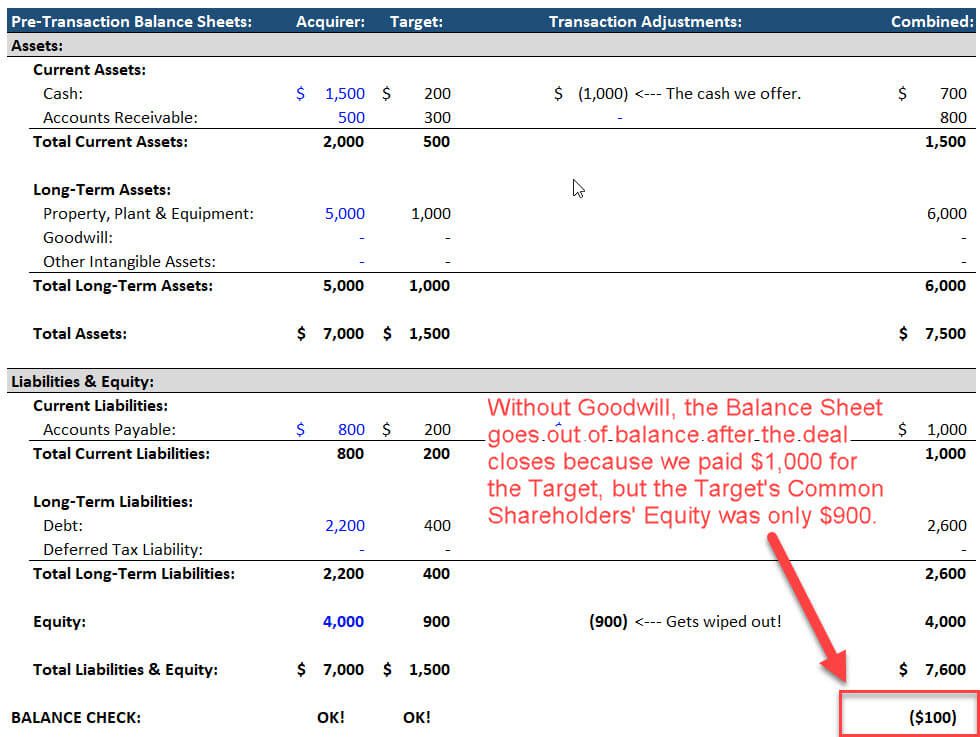 Source: breakingintowallstreet.com
Source: breakingintowallstreet.com
But referring to the intangible asset as being created is misleading an accounting journal entry is created but the intangible asset already exists. Some definitions of goodwill are. Find out more about goodwill accounting with our simple guide. The gap between the purchase price and the book value of a business is known as goodwill. In accounting goodwill is the value of the business that exceeds its assets minus the liabilities.
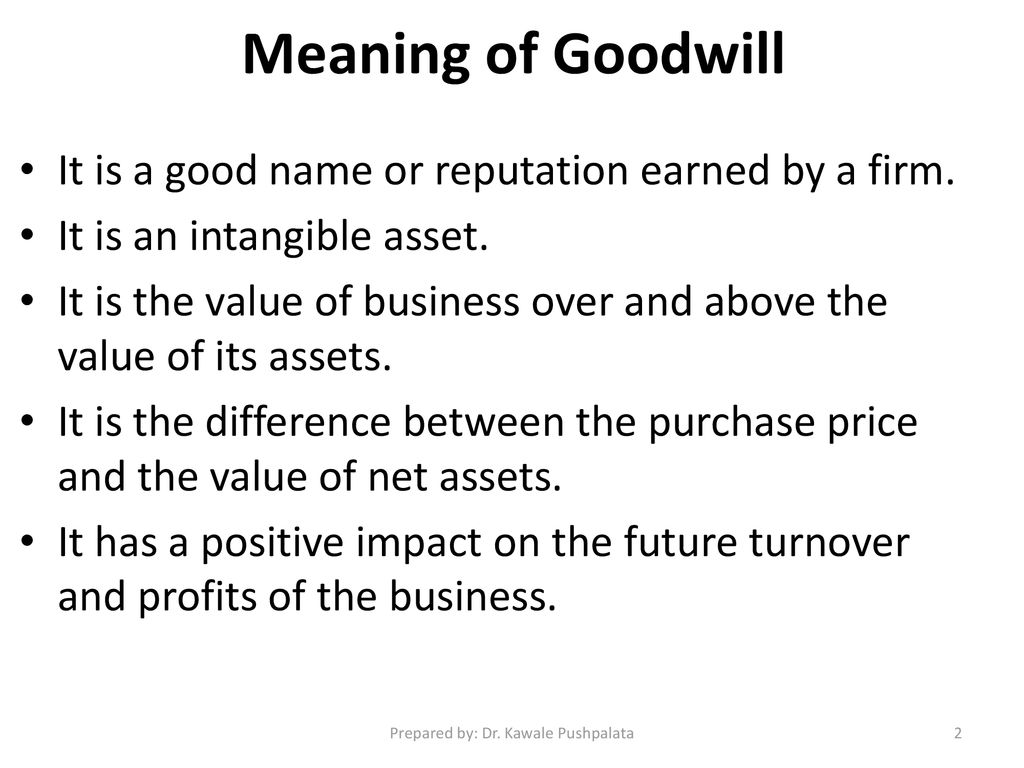 Source: slideplayer.com
Source: slideplayer.com
Goodwill arises when a company acquires another entire business. An intangible asset consisting of the public esteem in which a business is heldWhen a business is sold the difference between the value of the hard assets and the value of the income stream is often attributed to goodwill. According to SSAP-22 UK Accounting Standard on Accounting for Goodwill Goodwill is the difference between the value of a business as a whole and the aggregate of. Goodwill means good reputation of a companys business in the market. Some definitions of goodwill are.
This site is an open community for users to do sharing their favorite wallpapers on the internet, all images or pictures in this website are for personal wallpaper use only, it is stricly prohibited to use this wallpaper for commercial purposes, if you are the author and find this image is shared without your permission, please kindly raise a DMCA report to Us.
If you find this site adventageous, please support us by sharing this posts to your preference social media accounts like Facebook, Instagram and so on or you can also bookmark this blog page with the title goodwill meaning in accounting by using Ctrl + D for devices a laptop with a Windows operating system or Command + D for laptops with an Apple operating system. If you use a smartphone, you can also use the drawer menu of the browser you are using. Whether it’s a Windows, Mac, iOS or Android operating system, you will still be able to bookmark this website.
Category
Related By Category
- 22+ The little book that beats the market Coin
- 15++ Todays penny stocks to buy Trending
- 18++ Capital equipment Best
- 48+ Solar power penny stocks List
- 36++ Spread trading Bitcoin
- 28+ Lightspeed stock Top
- 12++ Best technical indicators Trend
- 15+ Stocks less than a penny Bitcoin
- 36++ Ccl share price Trend
- 36+ Cnr stock Trend